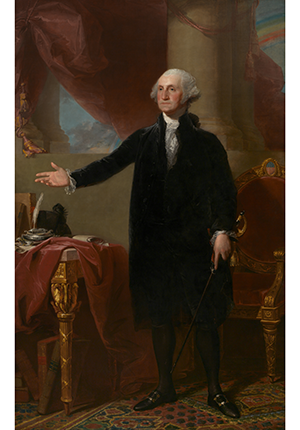Historic Document
Letter to the Society of Quakers (1789)
George Washington | 1789

National Portrait Gallery, Smithsonian Institution; acquired as a gift to the nation through the generosity of the Donald W. Reynolds Foundation
Summary
In the fall of 1789, the Quakers held their annual meeting in Philadelphia and shared a joint statement from that meeting with President George Washington. This statement extolled the virtues of the freedom of conscience and reaffirmed the Quaker community’s commitment to “lead[ing] quiet and peac[e]able Lives.” On October 13, 1789, President Washington responded with this letter—celebrating the Quakers’ contributions to America’s commitment to the freedom of conscience and expressing the duty of the government to tolerate the views of conscientious objectors.
Selected by

The National Constitution Center
Full Text
Gentlemen,
I receive with pleasure your affectionate address, and thank you for the friendly Sentiments & good wishes which you express for the Success of my administration, and for my personal Happiness.
We have Reason to rejoice in the prospect that the present National Government, which by the favor of Divine Providence, was formed by the common Counsels, and peaceably established with the common consent of the People, will prove a blessing to every denomination of them. To render it such, my best endeavours shall not be wanting.
Government being, among other purposes, instituted to protect the Persons and Consciences of men from oppression, it certainly is the duty of Rulers, not only to abstain from it themselves, but according to their Stations, to prevent it in others.
The liberty enjoyed by the People of these States, of worshipping Almighty God agreable to their Consciences, is not only among the choicest of their Blessings, but also of their Rights—While men perform their social Duties faithfully, they do all that Society or the State can with propriety demand or expect; and remain responsible only to their Maker for the Religion or modes of faith which they may prefer or profess.
Your principles & conduct are well known to me—and it is doing the People called Quakers no more than Justice to say, that (except their declining to share with others the burthen of the common defence) there is no Denomination among us who are more exemplary and useful Citizens.
I assure you very explicitly that in my opinion the Consciencious scruples of all men should be treated with great delicacy & tenderness, and it is my wish and desire that the Laws may always be as extensively accommodated to them, as a due regard to the Protection and essential Interests of the Nation may Justify, and permit.
Go: Washington




